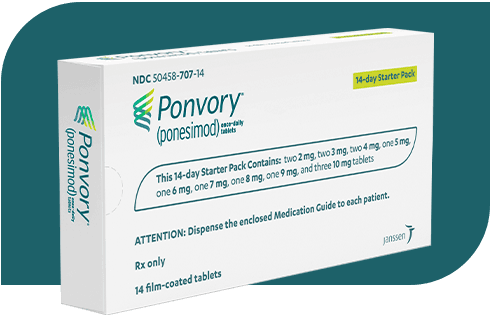Safety and side effects
It’s important to know the side effects of any new medicine you may start taking. Talk to your healthcare professional to see if PONVORY® is right for you.
The most common side effects of PONVORY®
in clinical studies were:
Upper respiratory tract infections
(PONVORY®
37% vs Aubagio® 34%)
Elevated liver enzymes (abnormal liver tests)
(PONVORY®
23% vs Aubagio® 12%)
High blood pressure (PONVORY® 10% vs Aubagio® 9%)
These aren’t all of the potential side effects of PONVORY®. For more information, ask your doctor or pharmacist. Tell your doctor if you have any side effects that bother you or that don’t go away.
Over 10 years of data across multiple studies
show PONVORY® has a proven safety
profile and is generally well-tolerated*
*Includes the phase 3 study; the phase 2, 6-month, placebo-controlled study; and the uncontrolled extension studies.
Potential serious side effects of PONVORY®
Remember, people can react to medicines differently. If you experience any of the following side effects while taking PONVORY®, be sure to talk to your healthcare professional about them.
PONVORY® can increase your risk of serious infections that can be life-threatening and cause death. PONVORY® lowers the number of white blood cells (lymphocytes) in your blood. This will usually go back to normal within 1 to 2 weeks of stopping treatment. Your healthcare professional should review a recent blood test of your white blood cells before you start taking PONVORY®.
Talk to your healthcare professional right away if you have any of these symptoms of an infection during treatment with PONVORY® and for 1 to 2 weeks after your last dose of PONVORY®:
- fever
- tiredness
- body aches
- chills
- nausea
- vomiting
- headache with fever, neck stiffness, sensitivity to light, nausea, or confusion (these may be symptoms of meningitis, an infection of the lining around your brain and spine)
Your healthcare professional may delay starting or may stop your PONVORY® treatment if you have an infection.
PONVORY® can cause your heart rate to slow down, especially after you take your first dose. To help reduce this risk, you will start your treatment using the 14-Day Starter Pack to slowly increase the dose over a 14-day period. You should have a test to check the electrical activity of your heart called an electrocardiogram (ECG) before you take your first dose of PONVORY®. Tell your healthcare professional if you experience the following symptoms of slow heart rate:
- dizziness
- lightheadedness
- feeling like your heart is beating slowly or skipping beats
- shortness of breath
- confusion
- chest pain
- tiredness
Some people who take PONVORY® have shortness of breath. Tell your healthcare professional right away if you have new or worsening breathing problems.
PONVORY® may cause liver problems. Your healthcare professional should do blood tests to check your liver before you start taking PONVORY®. Tell your healthcare professional right away if you have any of the following symptoms of liver problems:
- unexplained nausea
- vomiting
- stomach (abdominal) pain
- tiredness
- loss of appetite
- yellowing of the whites of your eyes or skin
- dark urine
Your healthcare professional should check your blood pressure during treatment with PONVORY®.
Certain types of skin cancer have happened with drugs in the same class as PONVORY®. Tell your healthcare professional if you have any changes in the appearance of your skin, including changes in a mole, a new darkened area on your skin, a sore that does not heal, or growths on your skin, such as a bump that may be shiny, pearly white, skin-colored, or pink. Your healthcare professional should check your skin for any changes during treatment with PONVORY®. Limit the amount of time you spend in sunlight and ultraviolet (UV) light. Wear protective clothing and use a sunscreen with a high sun protection factor.
Tell your healthcare professional about any changes in your vision. Your healthcare professional should test your vision before you start taking PONVORY® and any time you notice vision changes during treatment with PONVORY®. Your risk of macular edema is higher if you have diabetes or have had an inflammation of your eye called uveitis.
Tell your healthcare professional right away if you have any of the following symptoms:
- blurriness or shadows in the center of your vision
- a blind spot in the center of your vision
- sensitivity to light
- unusually colored (tinted) vision
A condition called Posterior Reversible Encephalopathy Syndrome (PRES) has happened with drugs in the same class as PONVORY®. Symptoms of PRES usually get better when you stop taking PONVORY®. However, if left untreated, it may lead to a stroke. Tell your healthcare professional right away if you have any of the following symptoms:
- sudden severe headache
- sudden confusion
- sudden loss of vision or other changes in your vision
- seizure
When PONVORY® is stopped, symptoms of MS may return and become worse compared with before or during treatment. Always talk to your healthcare professional before you stop taking PONVORY® for any reason. Tell your healthcare professional if you have worsening symptoms of MS after stopping PONVORY®.
These are only some of the potential side effects of PONVORY®. Please see the full Prescribing Information and Medication Guide to learn more about safety and potential side effects of PONVORY®.

Use the 14-Day Starter Pack when starting treatment
with PONVORY®
The Starter Pack is designed to help you take the right dose on the right day.
In clinical studies, PONVORY® had a slowing effect on people’s heart rates after the first dose. To reduce this possible side effect, you’ll start PONVORY® on a low dose that increases over 14 days.
It’s important to follow the recommended dosing instructions when using the Starter Pack.
Learn more about dosing information and dosing instructions for PONVORY®

